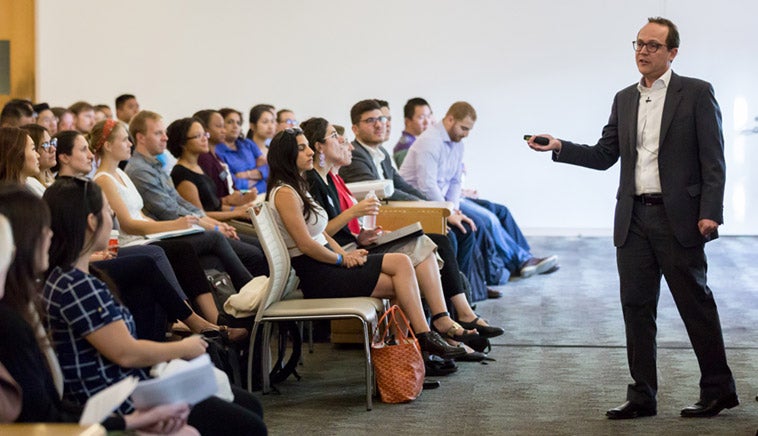Supporting Curiosity in the Classroom
Supporting Curiosity in the Classroom

Right: Eduardo Cetlin (’07)
Eduardo Cetlin (’07) is no stranger to a global and innovative education, having studied in Canada, Brazil and the United States. However, as president of the Amgen Foundation and executive director of philanthropy and responsibility at Amgen, his vision for the foundation's learning programs and the next generation of young scientists isn’t simply to replicate the educational path that has gotten him where he is today. Instead, Cetlin hopes to innovate the traditional education system, one that he says has been “designed to kill curiosity.”
The Amgen Foundation’s learning programs might just be a solution to reinvigorating traditional science education. The foundation is the philanthropic arm of Amgen, the multinational biopharmaceutical company based in Thousand Oaks. Its reach affects students at all educational levels, and it aims to support learners at every educational milestone. The Amgen Scholars Program partners with undergraduates for a research summer program, while the BioTech Experience involves more than 700,000 students and loans schools research-grade lab equipment; these are measures Cetlin believes can help bring curiosity back into the curriculum.

Cetlin also believes that his company has a simple, powerful mission to serve patients. “Without a highly skilled workforce, we don’t have a business. But that’s not enough. We need a scientifically literate society,” Cetlin told an audience assembled for Impact@Anderson’s recent High-Impact Tea event. He previously worked in finance for GE’s finance management programs and transportation systems. Upon moving to Amgen, he started out in corporate auditing and worked through steep learning curves to find solutions that could automate internal processes for the company. He described it as the best job change he could ever have made. Even after 14 years at the foundation, he finds that his job is never the same from year to year, and the future of science education and medicine will surely be evolving, too, always keeping those with a palpable passion for learning, like Cetlin, on their toes.
“Look at the world we live in today. Automation, machine learning, artificial intelligence all around. Here is the fusion between architects and engineers — that’s a reality today,” he said.
The changing landscape of the future workforce is a driver of investment in today’s science education. There’s an undeniable disconnect between the future we expect of the workforce and what’s happening in the classroom now. To Cetlin, supporting teachers and helping them become active, enthusiastic learners again helps shape a generation of scientists fully prepared for what’s to come.
As a final piece of advice to MBA students looking to drive change, as he does, Cetlin urged them to find the balance between their head and heart, and then to follow it. But most important, he told students to keep investing in learning, regardless of which sector they choose to enter.
“The conversations I’ve had in these spaces, taking these classes — these settings have been far more important than any technical knowledge,” Cetlin concluded. “It’s very hard to know what is going to be useful over time, so learn as much as you can.”